Professional Year Program Case Study 1: ACS Code of Ethics and Conduct
VerifiedAdded on 2022/10/19
|7
|960
|304
Case Study
AI Summary
This case study analyzes an ethical dilemma faced by John, a statistical database programmer, within the context of the Professional Year Program. John is under pressure to complete a large statistical program and is considering using code from his co-worker and a commercial software package to meet the deadline. The analysis focuses on the application of the ACS Code of Ethics, emphasizing key values such as honesty, competence, and professionalism. The case study explores the implications of John's actions, referencing Australian legislation and Thomas White's ethical framework to guide decision-making. The analysis concludes with recommendations for John, advising him to refrain from using external sources to maintain ethical standards and professional integrity. The document also includes a bibliography of relevant sources.
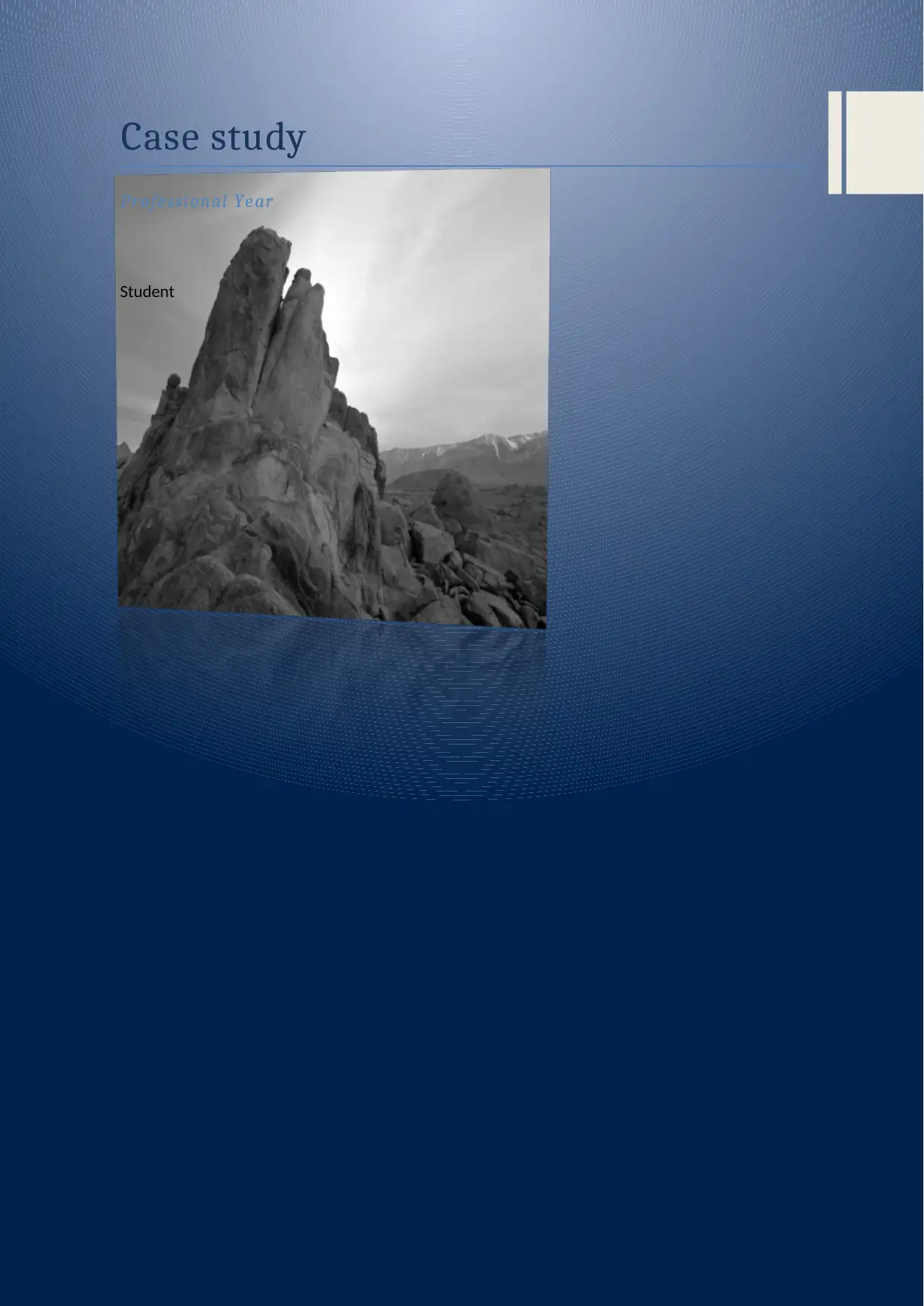
Case study
Professional Year
Student
Professional Year
Student
Paraphrase This Document
Need a fresh take? Get an instant paraphrase of this document with our AI Paraphraser
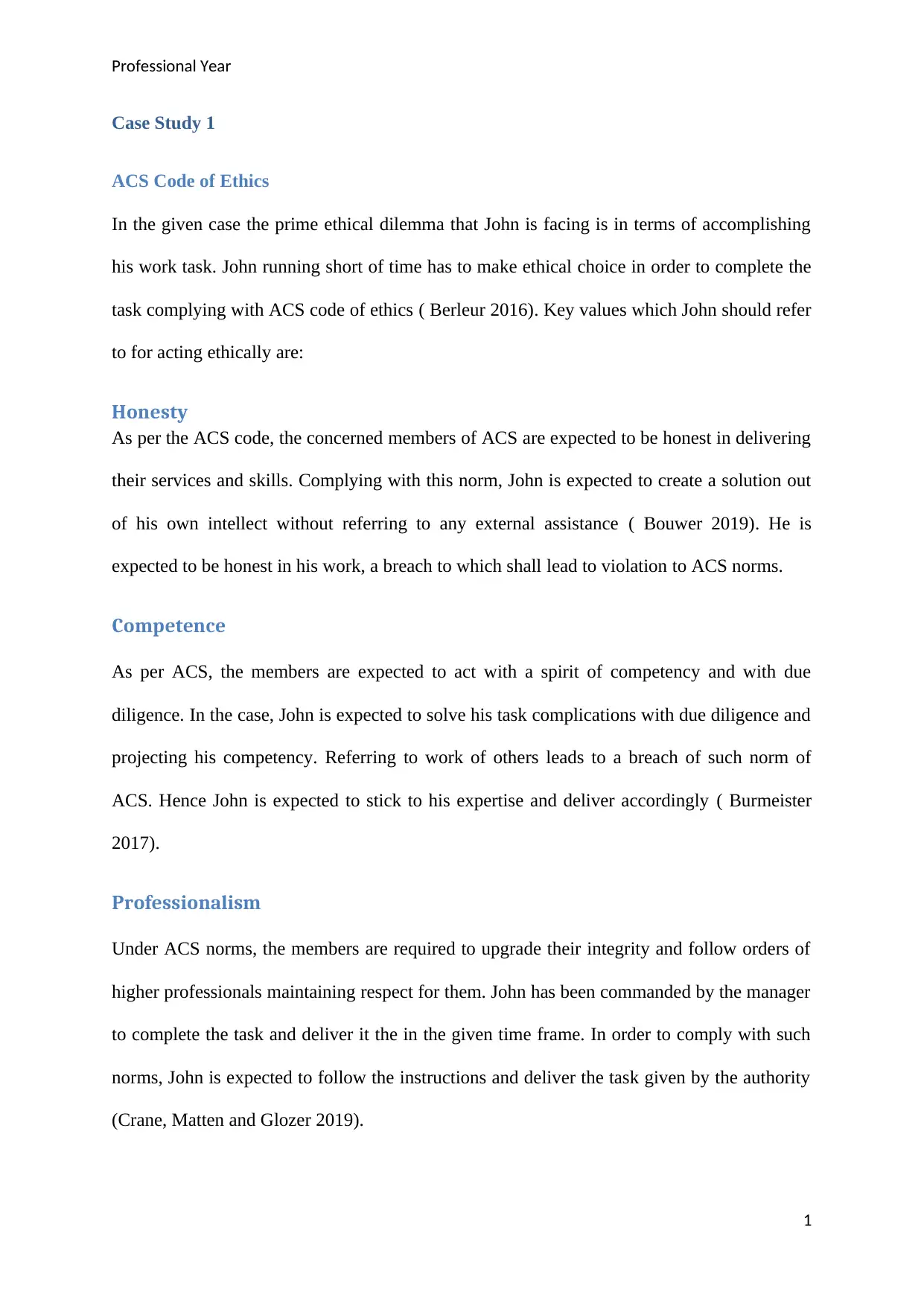
Professional Year
Case Study 1
ACS Code of Ethics
In the given case the prime ethical dilemma that John is facing is in terms of accomplishing
his work task. John running short of time has to make ethical choice in order to complete the
task complying with ACS code of ethics ( Berleur 2016). Key values which John should refer
to for acting ethically are:
Honesty
As per the ACS code, the concerned members of ACS are expected to be honest in delivering
their services and skills. Complying with this norm, John is expected to create a solution out
of his own intellect without referring to any external assistance ( Bouwer 2019). He is
expected to be honest in his work, a breach to which shall lead to violation to ACS norms.
Competence
As per ACS, the members are expected to act with a spirit of competency and with due
diligence. In the case, John is expected to solve his task complications with due diligence and
projecting his competency. Referring to work of others leads to a breach of such norm of
ACS. Hence John is expected to stick to his expertise and deliver accordingly ( Burmeister
2017).
Professionalism
Under ACS norms, the members are required to upgrade their integrity and follow orders of
higher professionals maintaining respect for them. John has been commanded by the manager
to complete the task and deliver it the in the given time frame. In order to comply with such
norms, John is expected to follow the instructions and deliver the task given by the authority
(Crane, Matten and Glozer 2019).
1
Case Study 1
ACS Code of Ethics
In the given case the prime ethical dilemma that John is facing is in terms of accomplishing
his work task. John running short of time has to make ethical choice in order to complete the
task complying with ACS code of ethics ( Berleur 2016). Key values which John should refer
to for acting ethically are:
Honesty
As per the ACS code, the concerned members of ACS are expected to be honest in delivering
their services and skills. Complying with this norm, John is expected to create a solution out
of his own intellect without referring to any external assistance ( Bouwer 2019). He is
expected to be honest in his work, a breach to which shall lead to violation to ACS norms.
Competence
As per ACS, the members are expected to act with a spirit of competency and with due
diligence. In the case, John is expected to solve his task complications with due diligence and
projecting his competency. Referring to work of others leads to a breach of such norm of
ACS. Hence John is expected to stick to his expertise and deliver accordingly ( Burmeister
2017).
Professionalism
Under ACS norms, the members are required to upgrade their integrity and follow orders of
higher professionals maintaining respect for them. John has been commanded by the manager
to complete the task and deliver it the in the given time frame. In order to comply with such
norms, John is expected to follow the instructions and deliver the task given by the authority
(Crane, Matten and Glozer 2019).
1
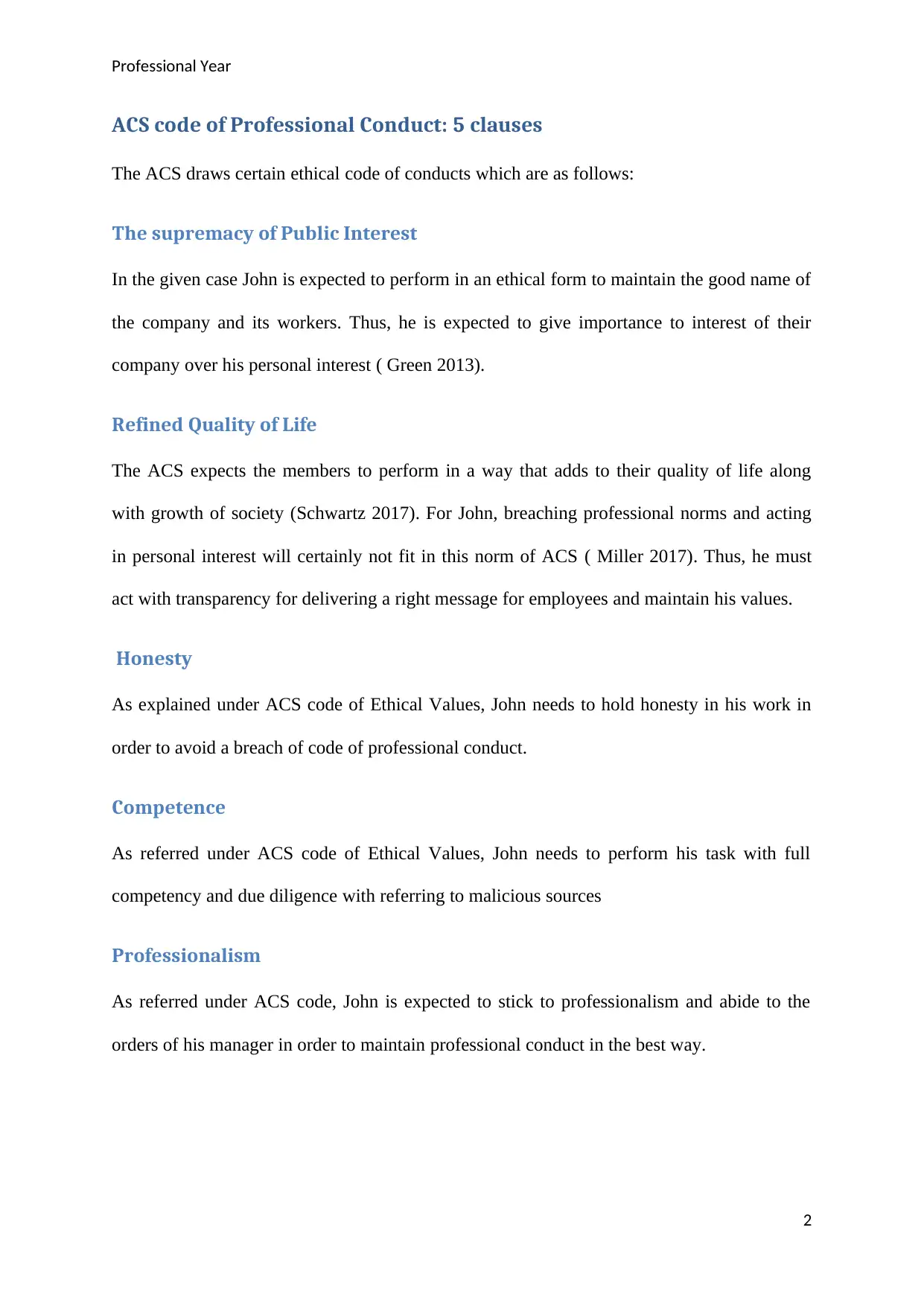
Professional Year
ACS code of Professional Conduct: 5 clauses
The ACS draws certain ethical code of conducts which are as follows:
The supremacy of Public Interest
In the given case John is expected to perform in an ethical form to maintain the good name of
the company and its workers. Thus, he is expected to give importance to interest of their
company over his personal interest ( Green 2013).
Refined Quality of Life
The ACS expects the members to perform in a way that adds to their quality of life along
with growth of society (Schwartz 2017). For John, breaching professional norms and acting
in personal interest will certainly not fit in this norm of ACS ( Miller 2017). Thus, he must
act with transparency for delivering a right message for employees and maintain his values.
Honesty
As explained under ACS code of Ethical Values, John needs to hold honesty in his work in
order to avoid a breach of code of professional conduct.
Competence
As referred under ACS code of Ethical Values, John needs to perform his task with full
competency and due diligence with referring to malicious sources
Professionalism
As referred under ACS code, John is expected to stick to professionalism and abide to the
orders of his manager in order to maintain professional conduct in the best way.
2
ACS code of Professional Conduct: 5 clauses
The ACS draws certain ethical code of conducts which are as follows:
The supremacy of Public Interest
In the given case John is expected to perform in an ethical form to maintain the good name of
the company and its workers. Thus, he is expected to give importance to interest of their
company over his personal interest ( Green 2013).
Refined Quality of Life
The ACS expects the members to perform in a way that adds to their quality of life along
with growth of society (Schwartz 2017). For John, breaching professional norms and acting
in personal interest will certainly not fit in this norm of ACS ( Miller 2017). Thus, he must
act with transparency for delivering a right message for employees and maintain his values.
Honesty
As explained under ACS code of Ethical Values, John needs to hold honesty in his work in
order to avoid a breach of code of professional conduct.
Competence
As referred under ACS code of Ethical Values, John needs to perform his task with full
competency and due diligence with referring to malicious sources
Professionalism
As referred under ACS code, John is expected to stick to professionalism and abide to the
orders of his manager in order to maintain professional conduct in the best way.
2
⊘ This is a preview!⊘
Do you want full access?
Subscribe today to unlock all pages.

Trusted by 1+ million students worldwide
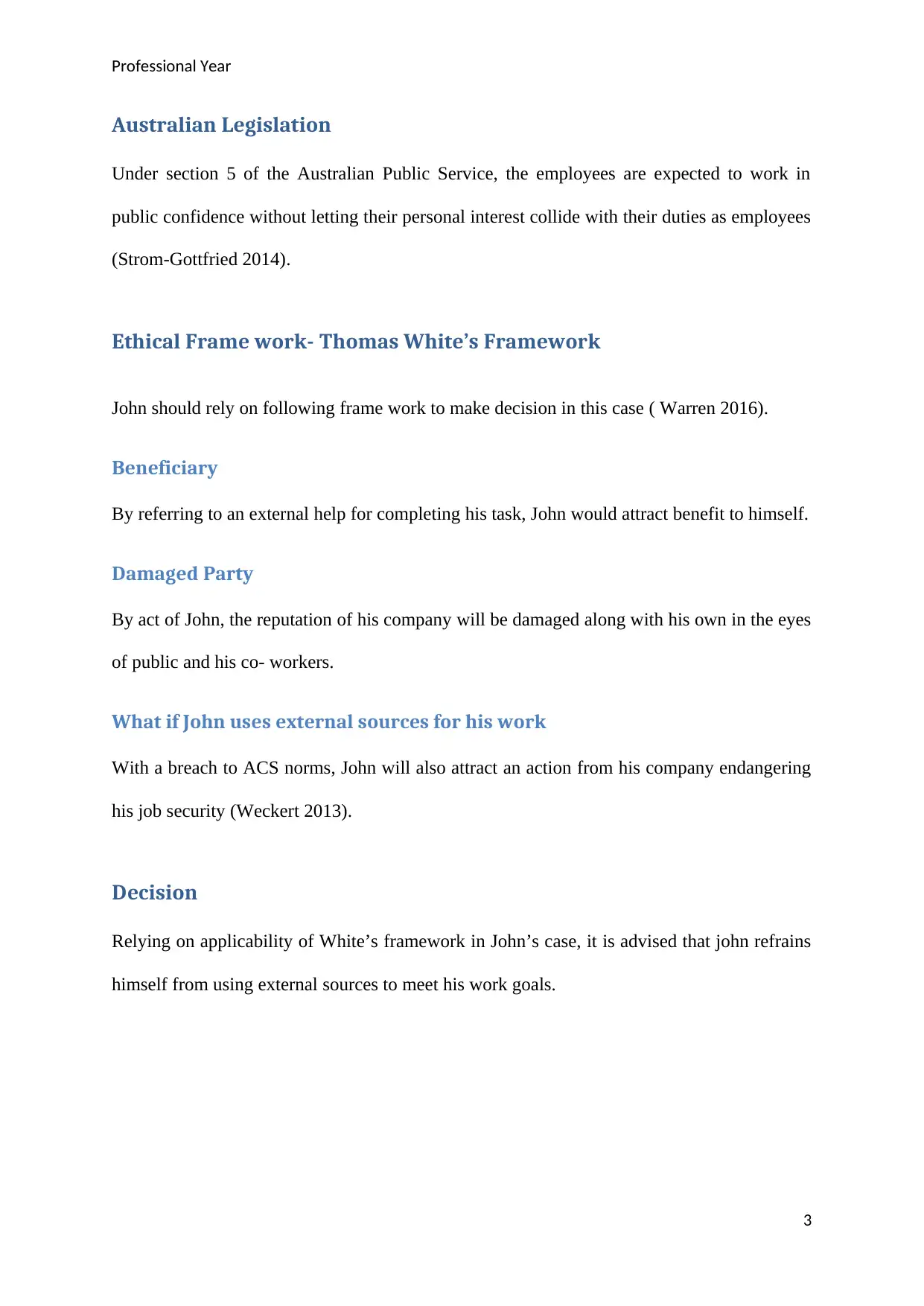
Professional Year
Australian Legislation
Under section 5 of the Australian Public Service, the employees are expected to work in
public confidence without letting their personal interest collide with their duties as employees
(Strom-Gottfried 2014).
Ethical Frame work- Thomas White’s Framework
John should rely on following frame work to make decision in this case ( Warren 2016).
Beneficiary
By referring to an external help for completing his task, John would attract benefit to himself.
Damaged Party
By act of John, the reputation of his company will be damaged along with his own in the eyes
of public and his co- workers.
What if John uses external sources for his work
With a breach to ACS norms, John will also attract an action from his company endangering
his job security (Weckert 2013).
Decision
Relying on applicability of White’s framework in John’s case, it is advised that john refrains
himself from using external sources to meet his work goals.
3
Australian Legislation
Under section 5 of the Australian Public Service, the employees are expected to work in
public confidence without letting their personal interest collide with their duties as employees
(Strom-Gottfried 2014).
Ethical Frame work- Thomas White’s Framework
John should rely on following frame work to make decision in this case ( Warren 2016).
Beneficiary
By referring to an external help for completing his task, John would attract benefit to himself.
Damaged Party
By act of John, the reputation of his company will be damaged along with his own in the eyes
of public and his co- workers.
What if John uses external sources for his work
With a breach to ACS norms, John will also attract an action from his company endangering
his job security (Weckert 2013).
Decision
Relying on applicability of White’s framework in John’s case, it is advised that john refrains
himself from using external sources to meet his work goals.
3
Paraphrase This Document
Need a fresh take? Get an instant paraphrase of this document with our AI Paraphraser
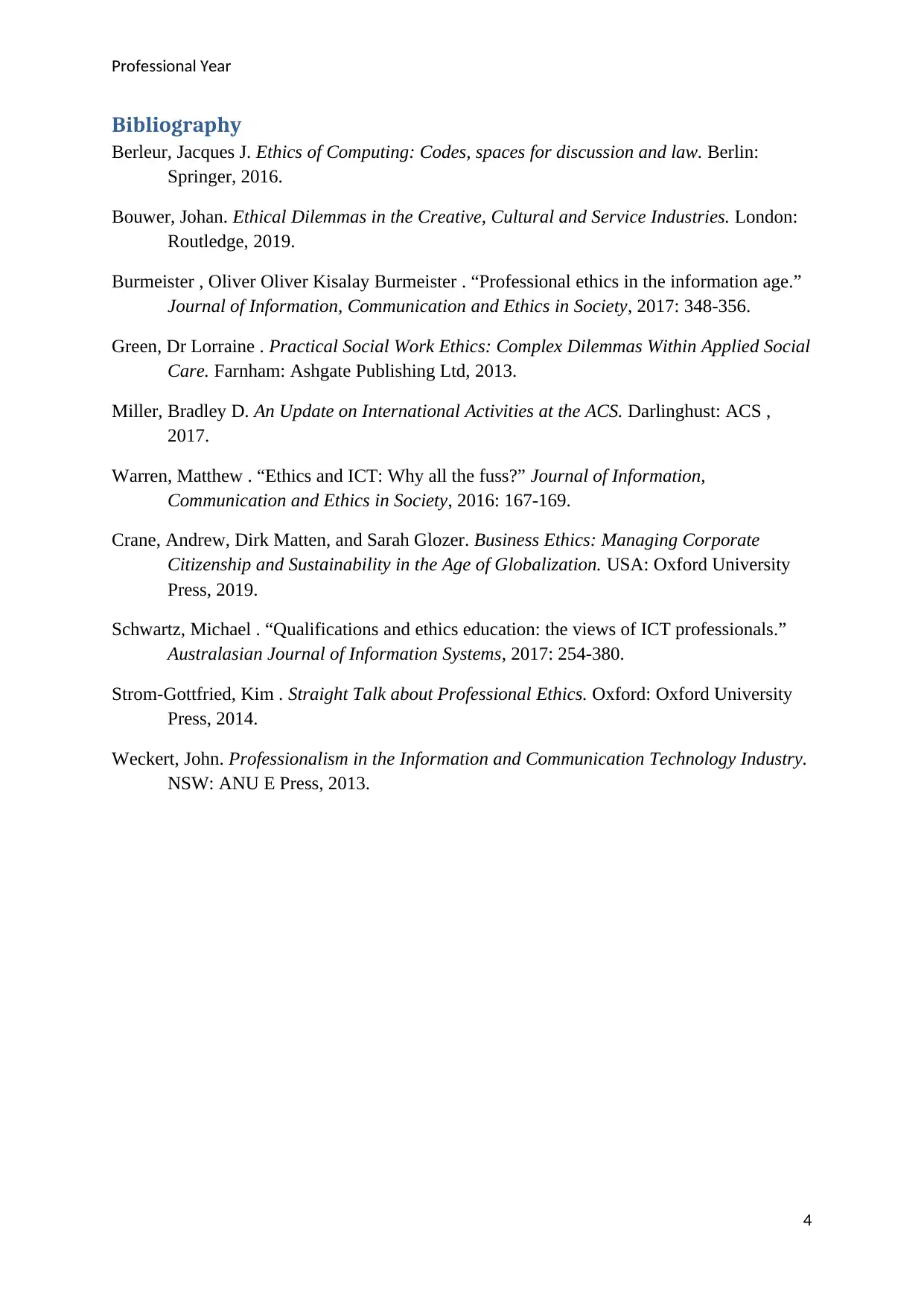
Professional Year
Bibliography
Berleur, Jacques J. Ethics of Computing: Codes, spaces for discussion and law. Berlin:
Springer, 2016.
Bouwer, Johan. Ethical Dilemmas in the Creative, Cultural and Service Industries. London:
Routledge, 2019.
Burmeister , Oliver Oliver Kisalay Burmeister . “Professional ethics in the information age.”
Journal of Information, Communication and Ethics in Society, 2017: 348-356.
Green, Dr Lorraine . Practical Social Work Ethics: Complex Dilemmas Within Applied Social
Care. Farnham: Ashgate Publishing Ltd, 2013.
Miller, Bradley D. An Update on International Activities at the ACS. Darlinghust: ACS ,
2017.
Warren, Matthew . “Ethics and ICT: Why all the fuss?” Journal of Information,
Communication and Ethics in Society, 2016: 167-169.
Crane, Andrew, Dirk Matten, and Sarah Glozer. Business Ethics: Managing Corporate
Citizenship and Sustainability in the Age of Globalization. USA: Oxford University
Press, 2019.
Schwartz, Michael . “Qualifications and ethics education: the views of ICT professionals.”
Australasian Journal of Information Systems, 2017: 254-380.
Strom-Gottfried, Kim . Straight Talk about Professional Ethics. Oxford: Oxford University
Press, 2014.
Weckert, John. Professionalism in the Information and Communication Technology Industry.
NSW: ANU E Press, 2013.
4
Bibliography
Berleur, Jacques J. Ethics of Computing: Codes, spaces for discussion and law. Berlin:
Springer, 2016.
Bouwer, Johan. Ethical Dilemmas in the Creative, Cultural and Service Industries. London:
Routledge, 2019.
Burmeister , Oliver Oliver Kisalay Burmeister . “Professional ethics in the information age.”
Journal of Information, Communication and Ethics in Society, 2017: 348-356.
Green, Dr Lorraine . Practical Social Work Ethics: Complex Dilemmas Within Applied Social
Care. Farnham: Ashgate Publishing Ltd, 2013.
Miller, Bradley D. An Update on International Activities at the ACS. Darlinghust: ACS ,
2017.
Warren, Matthew . “Ethics and ICT: Why all the fuss?” Journal of Information,
Communication and Ethics in Society, 2016: 167-169.
Crane, Andrew, Dirk Matten, and Sarah Glozer. Business Ethics: Managing Corporate
Citizenship and Sustainability in the Age of Globalization. USA: Oxford University
Press, 2019.
Schwartz, Michael . “Qualifications and ethics education: the views of ICT professionals.”
Australasian Journal of Information Systems, 2017: 254-380.
Strom-Gottfried, Kim . Straight Talk about Professional Ethics. Oxford: Oxford University
Press, 2014.
Weckert, John. Professionalism in the Information and Communication Technology Industry.
NSW: ANU E Press, 2013.
4
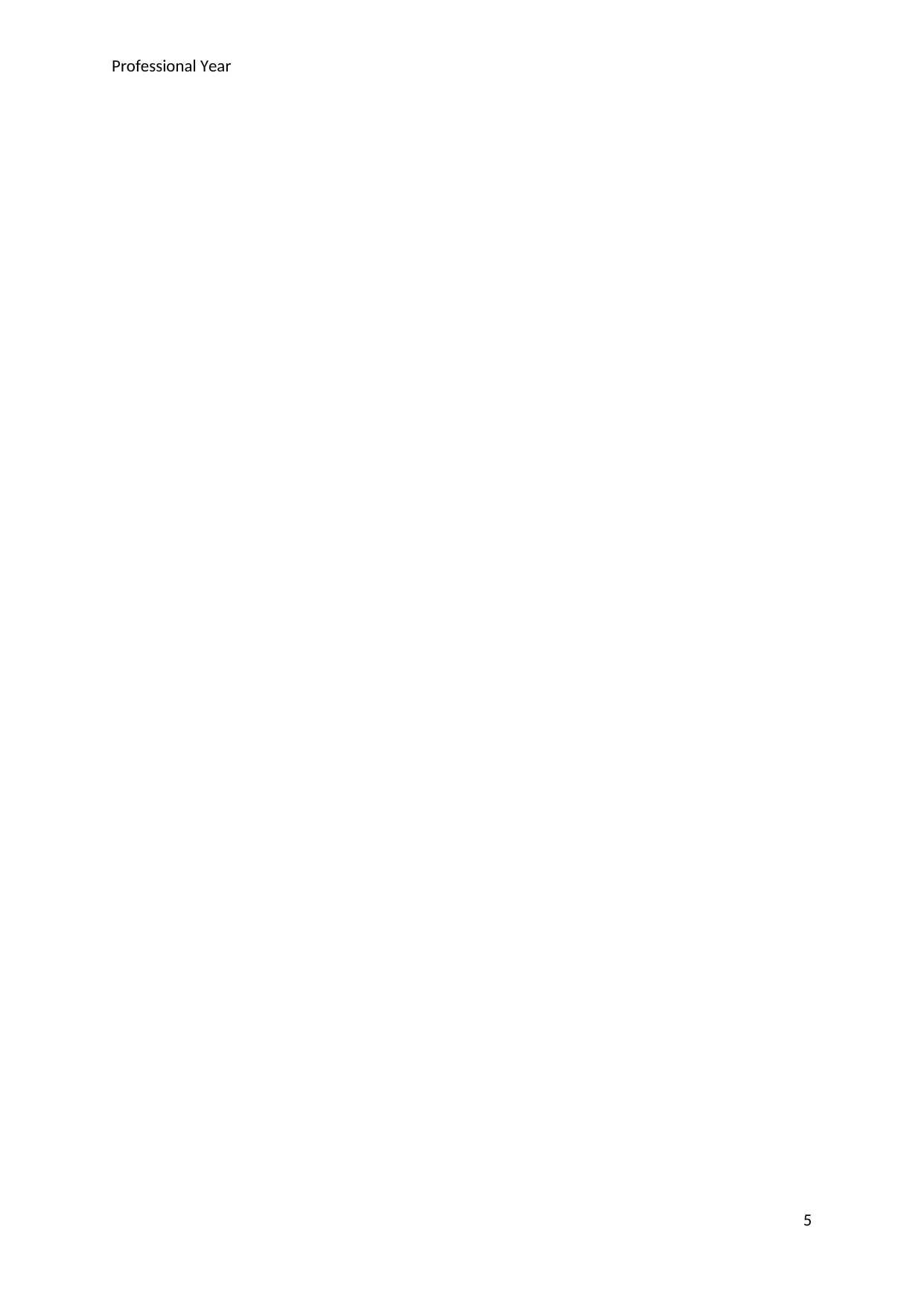
Professional Year
5
5
⊘ This is a preview!⊘
Do you want full access?
Subscribe today to unlock all pages.

Trusted by 1+ million students worldwide
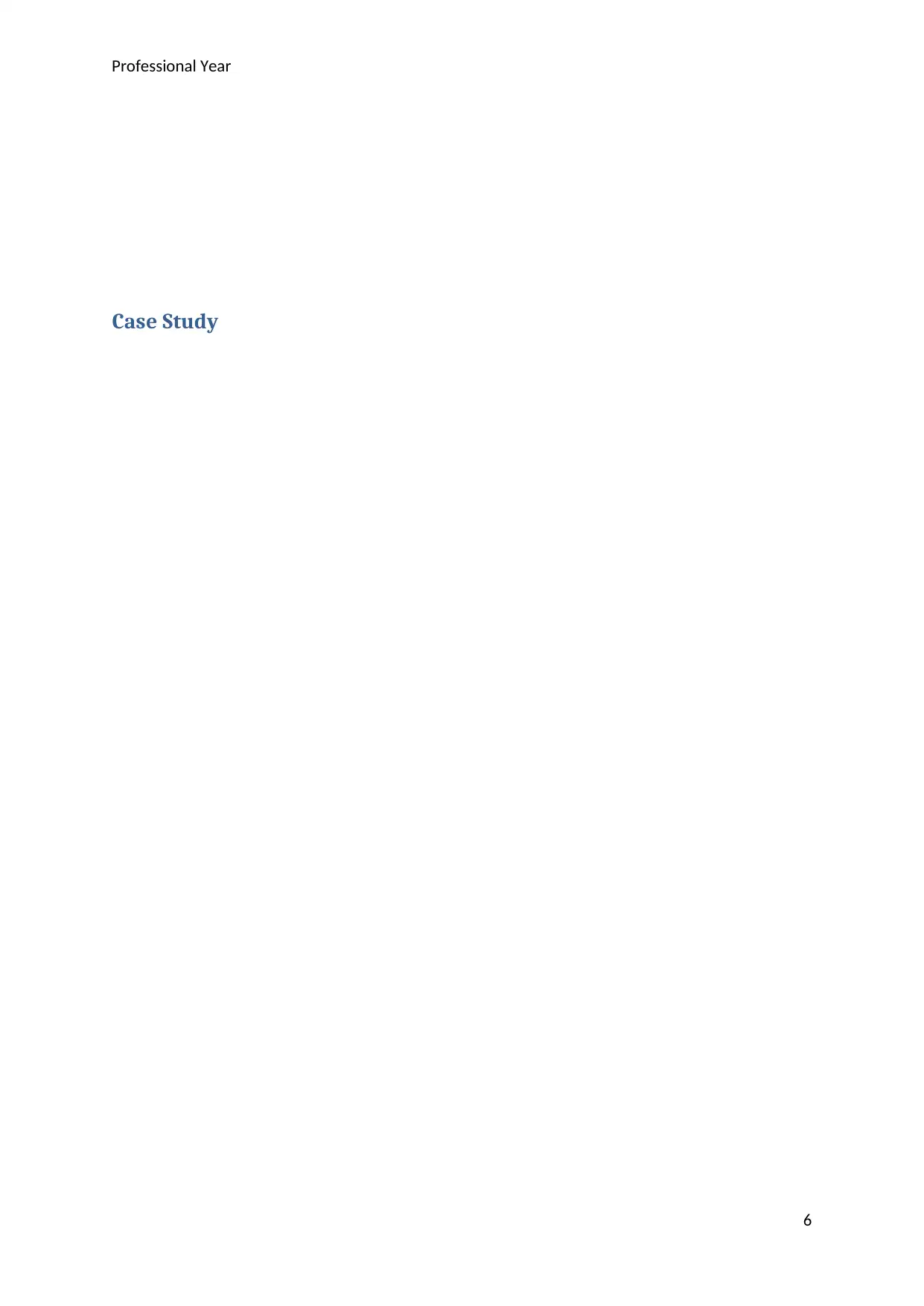
Professional Year
Case Study
6
Case Study
6
1 out of 7
Related Documents
Your All-in-One AI-Powered Toolkit for Academic Success.
+13062052269
info@desklib.com
Available 24*7 on WhatsApp / Email
![[object Object]](/_next/static/media/star-bottom.7253800d.svg)
Unlock your academic potential
Copyright © 2020–2026 A2Z Services. All Rights Reserved. Developed and managed by ZUCOL.





